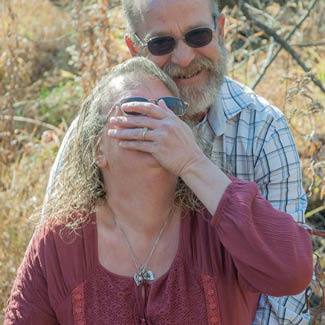-
Health & Wellness
The sound of success: How improved hearing aids career change

When does a trickle sound like a waterfall? After you get hearing aids, according to Charlie Pierce.
"I spent so many years not hearing the things that I can hear now. I can hear the smallest noise in the next room," he says. "It's incredible."
Charlie's improved hearing has done more than amplify the sounds he hears ― it helped the 55-year-old start a new career.
Construction work and overcoming addiction
For over 40 years, Charlie worked in construction. But his career was beginning to take a toll on his body, and he felt drawn to a different path — working with the Transportation Security Administration (TSA).
"I started the application process to work for the TSA, but I talked myself out of it," Charlie recalls, feeling that the timing wasn't right.

Charlie continued his job as a construction superintendent in Tennessee. He also overcame a 38-year addiction to drugs and alcohol, thanks to attending two addiction recovery programs in 2019. He and wife, Amy Pierce, were married the following year.
"Amy and I agreed that we wouldn't make any other major life changes until I was a year sober," he says.
Making a change
In September 2022, the Pierces decided to relocate to Faribault, Minnesota, to be closer to family. When Charlie saw an advertisement for TSA positions at the Minneapolis-St. Paul International Airport, he knew just what to do.
"It seemed like a God moment that I was seeing it again, so I applied," he says.
During the application screening and medical exam process, Charlie learned that years of construction and power tools had taken more than just a toll on his muscles and joints. He had hearing loss that could potentially exclude him from a TSA career.
Time was of the essence for Charlie in addressing his hearing issue. He knew that his application would be denied for medical reasons if he failed the hearing test.
"I knew I needed to see someone right away," he says. "I wasn't just going to give up at that point."

Audiology, hearing aids to the rescue
A week later, Charlie's hearing was evaluated by audiologist Dana McCray, Au.D., at Mayo Clinic Health System in Albert Lea, Minnesota.
"When Charlie arrived in my office, it was evident that it was extraordinarily important to him to get into TSA," says Dr. McCray. "He shared some of his story with me and how he was really working hard to get on a better path."
Dr. McCray thoroughly tested Charlie's hearing and discovered that his damage was different in each ear.
"In most cases when hearing changes, it happens equally, left and right," says Dr. McCray. "His loss is milder on the left and moderately severe on the right. We may never really know what caused the greater loss for Charlie in just one ear."
Dr. McCray explained the degree of Charlie's hearing loss to him and recommended hearing aids to improve it. Hearing aids digitally process incoming sounds. They make soft sounds more audible while keeping a limit on the overall output so that the volume isn't too loud.
Charlie was fitted with hearing aids that have a small instrument behind the ear connected to a domed earpiece in each canal. Dr. McCray explains that this style is comfortable for people who wear glasses like Charlie. They are also well-suited for the field he wanted to enter.
"Charlie needed something that would help him hear as clearly as possible in difficult environments with background noise," says Dr. McCray. "His hearing aids are the same model in each ear, but they are programmed differently based on his hearing loss."
Dr. McCray explains that some professions — including construction — increase the risk of hearing loss due to loud noises from equipment or instruments used. Some other examples include mechanics, truck drivers, farmers, factory workers, surgeons and dentists.
"If your employer requires hearing protection on the job, use it. Noisy hobbies, like woodworking, hunting and engine repairs, should also include hearing protection when sound levels are high," says Dr. McCray. "Hearing loss has an additive effect over a lifetime so preserving [hearing] early makes a difference."
Moving forward
Two weeks after his initial appointment, Charlie got his new hearing aids. Dr. McCray completed the necessary paperwork and testing so he would clear the employment medical evaluation. He was hired by the TSA and began training.
In July, Charlie was selected to give the graduation address at the end of TSA training. He shared his speech with Dr. McCray at a follow-up appointment.
"It was really moving to know that all his effort and hard work had brought him to that grand conclusion," says Dr. McCray. "I am really proud of him."
Charlie says he is enjoying his new career at the airport and is grateful for the expertise of the Mayo Clinic Health System Audiology team.
"The work that Dr. McCray did was above and beyond to help make all this stuff come to fruition for me," he says. "She is like a master of her craft and knew exactly what we needed to do."
This article first published on the Mayo Clinic Health System blog.
Related Articles







